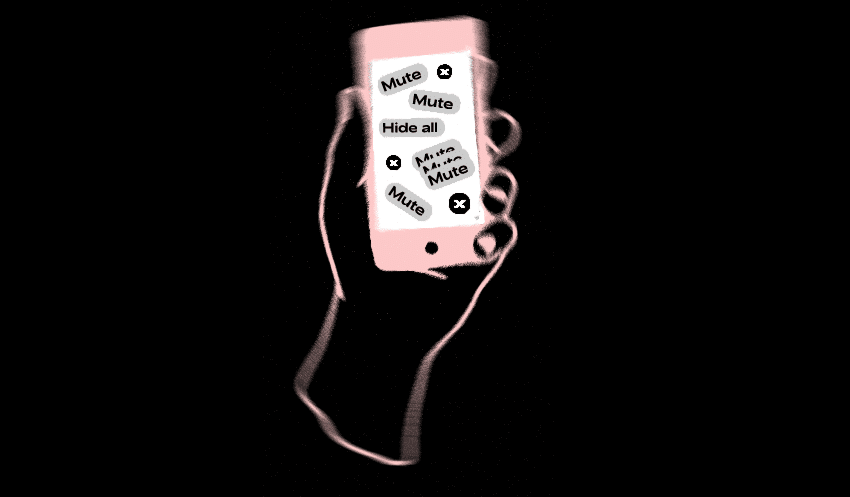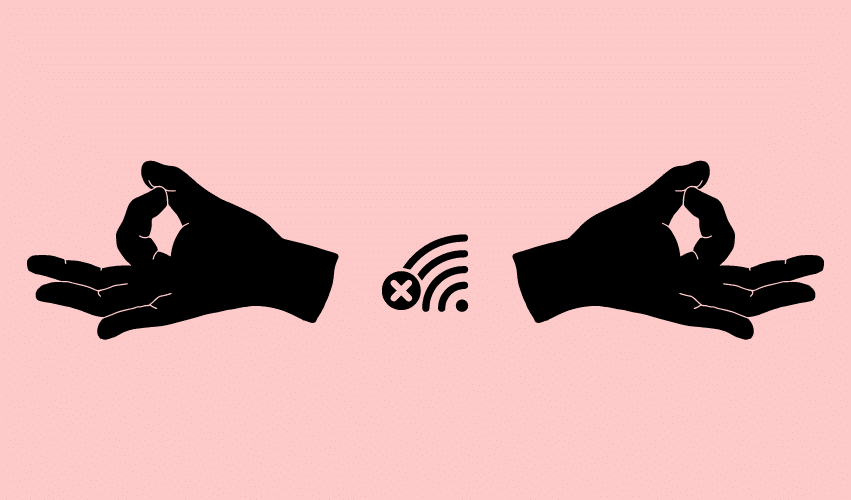Why Taking a Break From Following the News Was the Best Thing I Could Do for My Mental Health
Why Taking A Break From Following The News Was The Best Thing I Could Do For My Mental Health
By Kemi Fatoba
Art by Keano Anton

Mental health matters! We’re getting up close and personal about what happens when we cross the self-protective lines we set for ourselves, as well as chatting about therapy, stress, anxiety and more.
Ever since I was little, I’ve had an ambivalent relationship to watching the news. It was the only thing adults seemed to care about, so clearly it was important. Whenever I watched the news though, I got sad and often broke down in tears because they made the world look like a terrible place. I was in primary school when I watched wars unfold in faraway countries – and then realised that these countries weren’t so far away after all, when our class teacher asked us to pack boxes with food and clothing for the refugees that arrived weeks later. Watching the news always felt like a responsibility I couldn’t opt out of, as doing so would mean turning a blind eye to the suffering that was going on elsewhere. Simply put, it meant being ignorant. And so I kept watching and thought that feeling depressed afterwards was just a part of being an adult.
A few years ago, when I lived in London, I reached a point where I was entirely addicted to following the news. I started my day with a morning briefing from the BBC, The Guardian and The New York Times, before I rushed to the bathroom so I didn’t miss my 10 minute shower slot. During my commute I’d read everything I saved on my phone, and by the time I arrived at the office and made myself some tea, I could be sure that someone would mention a story I had just read. On my lunch breaks I’d read more news stories, and then some more on the commute home. In the evenings, all my flatmates would gather round the TV to watch the BBC and Channel 4 news, and then chat about what we’d just watched. It was a ritual everyone I knew seemed to follow.
Back then I was also suffering from anxiety and depression and my news binges only exacerbated all the bad thoughts that my mind was full of. At the same time I felt it was my responsibility to be informed about what was going on in the world. When young Black boys were stabbed and killed in the UK and US, I wanted to know what the police were doing to bring justice to their families. I wanted to know what politicians would do about the ongoing housing crisis and the EU-referendum. I wanted to know what was going on in Syria and why so many African migrants died on their way to Europe.
It wasn’t until my therapist suggested I take a break from it all that I started questioning this bad habit. She simply said that my worrying about everything that was going in the world did nothing to change it, and that I should focus on the things I could actually change instead. It was simple and profound. And so I went cold turkey and stopped. I became a passive consumer of the news, got the basic jist of what was going on, but didn’t really feel like I could participate in conversations like I did before, which made me feel incredibly ignorant and embarrassed – but on the whole I felt so much better. The world was still a cruel place, but ignorance really was bliss. That was six years ago and since then I’ve been slowly recovering from my unhealthy habit and started to consume news in a more healthy way again… until Facebook and, yeah, sure, also DADDY fucked it up for me again.
Ever since I was little, I’ve had an ambivalent relationship to watching the news. It was the only thing adults seemed to care about, so clearly it was important. Whenever I watched the news though, I got sad and often broke down in tears because they made the world look like a terrible place. I was in primary school when I watched wars unfold in faraway countries – and then realised that these countries weren’t so far away after all, when our class teacher asked us to pack boxes with food and clothing for the refugees that arrived weeks later. Watching the news always felt like a responsibility I couldn’t opt out of, as doing so would mean turning a blind eye to the suffering that was going on elsewhere. Simply put, it meant being ignorant. And so I kept watching and thought that feeling depressed afterwards was just a part of being an adult.
A few years ago, when I lived in London, I reached a point where I was entirely addicted to following the news. I started my day with a morning briefing from the BBC, The Guardian and The New York Times, before I rushed to the bathroom so I didn’t miss my 10 minute shower slot. During my commute I’d read everything I saved on my phone, and by the time I arrived at the office and made myself some tea, I could be sure that someone would mention a story I had just read. On my lunch breaks I’d read more news stories, and then some more on the commute home. In the evenings, all my flatmates would gather round the TV to watch the BBC and Channel 4 news, and then chat about what we’d just watched. It was a ritual everyone I knew seemed to follow.
Back then I was also suffering from anxiety and depression and my news binges only exacerbated all the bad thoughts that my mind was full of. At the same time I felt it was my responsibility to be informed about what was going on in the world. When young Black boys were stabbed and killed in the UK and US, I wanted to know what the police were doing to bring justice to their families. I wanted to know what politicians would do about the ongoing housing crisis and the EU-referendum. I wanted to know what was going on in Syria and why so many African migrants died on their way to Europe.
It wasn’t until my therapist suggested I take a break from it all that I started questioning this bad habit. She simply said that my worrying about everything that was going in the world did nothing to change it, and that I should focus on the things I could actually change instead. It was simple and profound. And so I went cold turkey and stopped. I became a passive consumer of the news, got the basic jist of what was going on, but didn’t really feel like I

Ever since we started DADDY, I’ve met amazing people, made wonderful new friends, and my old friends have been so lovely and supportive of us. What has also happened is that a lot of friends and acquaintances have started sharing relevant news with us – good news, but also a whole lot of bad news. Sometimes that meant waking up to beautiful empowering messages of love and inclusion. Other times it meant waking up to graphic videos and images of hate crimes and police brutality.
Depression and anxiety have a way of creeping into our lives that is insidious. Little by little they start sucking all the joy out our bodies in a way that’s all-encompassing – and before we know it, we feel completely hopeless and have no idea how we’ve reached this point. I could feel that happening to me again, and even though I wasn’t actively news-bingeing, I knew that being bombarded with news focused on racism, discrimination and images of people who looked like me and suffered, were doing nothing for my mental health. And so I opted out again – but this time I didn’t stop watching the news completely. I stopped following everyone who ONLY ever shared depressing news with me, and never anything that made me feel good. I stopped following everyone who ruined my day by sharing graphic videos and photos of extreme violence first thing in the morning, when I was struggling to find a reason to get out of bed anyway. And I started telling people that if they actually cared about me and my well-being they’d stop constantly dumping those grim stories in my inbox because I followed the news and didn’t need them to remind me of everything that went wrong in the world. I went cold turkey on everyone who made me feel like racism, oppression and suffering were omnipresent and made me forget that there are also so many things that are beautiful in this world. In the words of my former therapist, I told them – and myself – that worrying about everything that was going in the world did nothing to change it, and that they should focus on the things they could actually change instead.
Get DADDY in your Inbox
Stay in the loop by subscribing to our newsletter